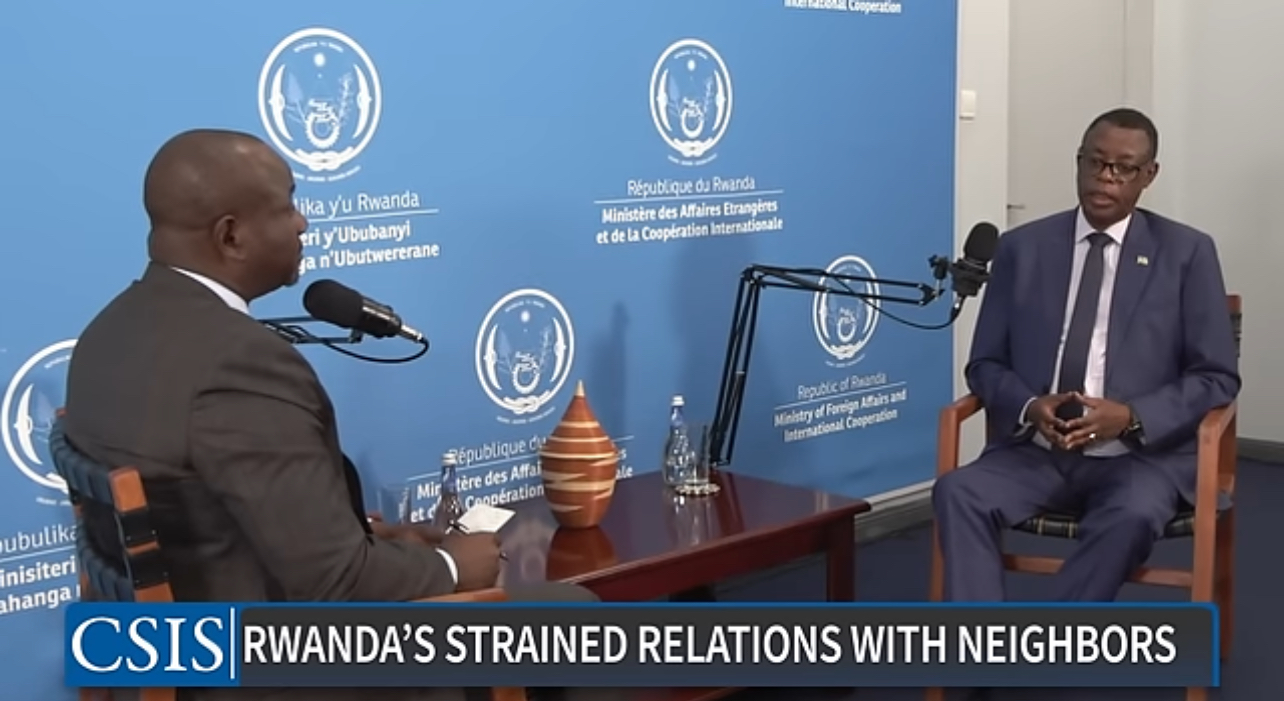In a recent interview with CSIS, (Rtd) General James Kabarebe, Rwanda’s Minister of State for Foreign Affairs, offered an in-depth look into Rwanda’s complex and often challenging relations with its neighbors, particularly Burundi. Kabarebe, a veteran figure in Rwanda’s political and military landscape, addressed recent tensions with Burundi that have arisen from both historical ties and present-day political realities.
While advocating for dialogue, Kabarebe expressed concern over rhetoric from Burundian President Evariste Ndayishimiye, who recently suggested that Burundi might consider ousting Rwanda’s President Paul Kagame by supporting enemies through means of gun power.
Kabarebe attributed the tensions with Burundi to internal pressures rather than a genuine desire for conflict. “Historically, we have not had any problems with Burundi,” Kabarebe remarked, emphasizing the cultural and social bonds between the two countries. He noted that difficulties began after a failed coup attempt in 2015, which led thousands of Burundian citizens to seek refuge in Rwanda. “Their people fled here, and we disarmed them, cantoned them, and we still have them,” he said, emphasizing Rwanda’s commitment to regional peace and humanitarian support for those displaced by political turmoil.
Despite this, Burundi’s recent alliance with the Democratic Republic of Congo (DRC) in military actions against the M23 rebel group—a group Rwanda sees as countering hostile forces in the region—has added strain. Kabarebe explained that the DRC’s military includes members of the FDLR, a militia group tied to perpetrators of the 1994 genocide against the Tutsi in Rwanda. “Burundi joining the forces of the DRC that incorporate the genocidal forces … brought up an ideological connotation to the conflict,” he stated, adding that Rwanda viewed Burundi’s partnership with the DRC as a betrayal. For Rwanda, alliances between neighbors and groups linked to past atrocities represent an unacceptable threat.
Kabarebe also addressed Rwanda’s diplomatic stance amid Burundi’s inflammatory rhetoric. He emphasized that Rwanda remains committed to resolving differences through dialogue and expressed optimism about improving relations with Burundi. “With Burundi, we can still talk. We are even talking today,” he said, adding that Rwanda is hopeful that “it will not take so long” for the borders to reopen and for full cooperation to resume. Kabarebe clarified that Rwanda never closed its borders to Burundi; rather, it was Burundi that made the decision to close its side of the border.
An additional point of contention is Burundi’s request for Rwanda to repatriate individuals involved in the 2015 coup attempt. Kabarebe confirmed that Rwanda is willing to consider this request but insists on guarantees for their safety. “We could hand them over to Burundi … but you cannot just hand over people without any guarantees,” he explained, stressing the need for Rwanda to safeguard its diplomatic credibility and ensure fair treatment for those individuals.
Kabarebe’s comments also provided insight into Rwanda’s broader foreign policy approach, especially its unwavering stance against groups tied to the genocide. This is a boundary that Rwanda refuses to compromise, and it perceives alliances between its neighbors and these groups as existential threats. Observers note that Rwanda’s diplomatic balancing act takes place in a challenging context, effectively “sandwiched” between neighbors that sometimes display open hostility. Tensions have also flared with Uganda in recent years, leading to border closures and mutual accusations of interference. Yet Rwanda has managed to maintain a positive relationship with Tanzania, even in light of regional instability.
“Rwanda has had friction pretty much with all their neighbors,” Kabarebe admitted, though he was quick to downplay the severity of these issues. “It’s maybe a perception that one struggles to live with their neighbors, but it’s not true,” he argued, emphasizing Rwanda’s resilience and its focus on constructive relations.
This diplomatic outlook, however, does not negate the serious challenges Rwanda faces. Observers argue that Rwanda’s position in the East African region—bordered by countries with various degrees of political instability and internal conflict—has compelled it to adopt a defensive stance. They point to the limitations of regional efforts through the East African Community (EAC), which has grown to include seven member states.
While the EAC has succeeded in economic integration, achieving full political and security cohesion remains a lengthy process. Kabarebe acknowledged this, stating, “Integration, multilateralism is a process. It’s not something that you achieve overnight.” Rwanda sees the EAC as vital to long-term stability, but the realities on the ground show that political divisions continue to hamper unity.
In addressing the current environment, Kabarebe expressed Rwanda’s frustration with what he perceives as an anti-Rwanda and particularly anti-Tutsi sentiment fostered by DRC leadership as a political tool. He believes that this narrative has been leveraged to distract from internal governance failures. “Rwanda would equally have the same reasons to create and construct an anti-Congolese narrative here … but we have not,” he stated.
Kabarebe insisted that Rwanda has refrained from inciting anti-Congolese sentiment, aiming instead to encourage coexistence and open borders. “We do not demonize the Congolese. We do not incite Rwandans against the Congolese,” he explained, adding that Rwanda’s open border policy allows Congolese citizens to move freely into Rwanda, even as tensions continue.
Kabarebe’s statements reflect Rwanda’s balancing act as it strives for peace while managing historical grievances and regional hostility. The ongoing diplomatic efforts with Burundi are a testament to Rwanda’s desire for a stable East African region, despite the complexities of its geopolitical landscape. For Rwanda, the stakes are high: ongoing tensions with neighboring countries could impact its hard-won security and economic progress. The challenge for Rwanda lies in navigating these hostilities with a commitment to dialogue, striving for a vision of coexistence and collaboration within a region that remains politically and ideologically fragmented.
Watch the full interview below.
https://youtu.be/nxEFebqJ968?si=0kkkMLuaoGWEhkFN




















